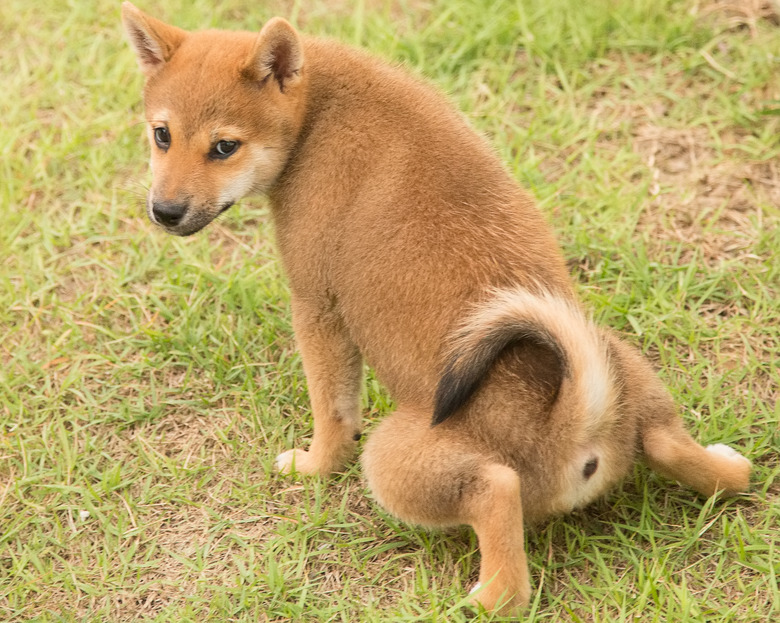What Is The Average Time For Housebreaking A Puppy?
Potty training is one of the less enjoyable aspects of adopting a puppy, but it is one of the first things you'll want to teach her. Don't despair if, after a week of instruction and reinforcement, she's still leaving puddles and packages in inappropriate places. The Humane Society of the United States advises puppy parents that housetraining can take several weeks on the average, and some breeds take longer than others. Additionally, every puppy has a unique personality, making it difficult to pinpoint a specific time frame for housebreaking all dogs. If you stay positive and have patience, your precious pup will catch on.
Distinctive Personalities
Distinctive Personalities
Just like people, dogs each have their own personalities with traits and quirks that make it easier or more difficult when training them. Sometimes those traits are related to the breed. Sometimes it's simply that the pup is stubborn, strong-willed or needs to be taught the potty training ropes in a different way than others. The American Society for the Prevention of Cruelty to Animals says that some puppies simply catch on easier, but it's normal for training to stall or even regress. Give your pooch credit for being her own person. Look for what works and what doesn't with her individual personality, and don't hold her to a particular timetable for becoming fully housetrained.
Some Breeds Are Easier
Some Breeds Are Easier
If you're looking to adopt a dog that is easy to potty train, you may want to stick with larger breeds. The Canine Information Library says they are genetically closer than small and toy breeds to primitive dogs, who instinctively avoided eliminating in their dens. That's why breeds such as Doberman pinschers, chow chows, Norwegian elkhounds, poodles and Shiba Inus have a reputation for quick housetraining. For prospective pooch parents who prefer a smaller dog, Cavalier King Charles Spaniels are known for being among the easiest to train. If you opt for a breed that's smaller than that, even with a beagle or a pug, you may end up potty training for up to a year.
Steps to Speed Up Housebreaking
Steps to Speed Up Housebreaking
Most pups respond well to basic housebreaking methods and, if you follow through with them and stay consistent, your pup's potty training program should be completed more quickly. Designate a potty place, whether it's a piddle pad in the laundry room or a specific corner of the backyard, and always take your puppy there when she needs to relieve herself. "The Doctors Book of Home Remedies for Dogs and Cats" advises getting your pup on a schedule, too. The rule of thumb is that a pup can hold her bladder one hour for every month of her age, but during training it's wise to take her to the designated potty spot every two hours, as well as first thing in the morning, after meals and drinking, after playing and last thing before bedtime. Also, take your pup to her elimination spot if she shows signs that she has to "go," such as appearing anxious or nosing around. Consistency and reinforcement will help the training sink in.
Positive Reinforcement, Not Punishment
Positive Reinforcement, Not Punishment
When it comes to housebreaking puppies, the University of Tennessee College of Veterinary Medicine says that punishing pups for accidents isn't effective. Swats with a newspaper or rubbing your pup's nose in her mess will only frighten and confuse her, and may even lead her to believe it's the act of elimination itself rather than the spot she's in that is upsetting you. Instead of focusing on accidents, concentrate on the times she gets it right. Praise her excitedly every time she eliminates in the designated spot. Giving her a treat positively reinforces that your pup is on the right track. Have treats on hand so you can do it immediately, though. The Humane Society of the United States says it's vital to reward your pup right away to reinforce eliminating in the proper place.
References
- The Canine Information Library: Easiest Dog Breeds to Housebreak
- The Humane Society of the United States: How to Housetrain Your Dog or Puppy
- ASPCA: House Training Your Puppy
- University of Tennessee College of Veterinary Medicine: Tips on House Training Puppies: The Dos and Don'ts
- ASPCA: Living With Small Dogs
- The Doctors Book of Home Remedies for Dogs and Cats; the Editors of Prevention Health Books
